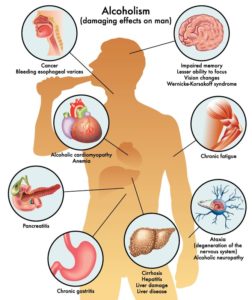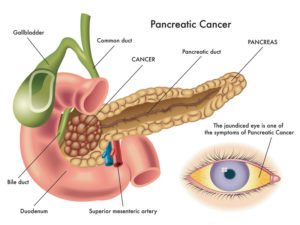Pancreatic cancer is one of the deadliest forms of cancer. Each year, approximately 5.500 people are diagnosed with pancreatic cancer in Canada and more than 4,800 will die from it (87%). The disease is often diagnosed at an advanced stage, and improved approaches to early detection and treatment are very important for doctors and researchers.
It has long been known that heavy drinking can damages the pancreas and that excessive alcohol consumption can contribute to pancreatitis, an inflammation of the pancreas characterized by severe abdominal pain, nausea, fever, sweating and vomiting.
It spares no one, no matter how famous and rich you are. Famous people who died of pancreatic cancer? Steve Jobs, Alan Rickman, Patrick Swayze, Syd Barrett, Bill Hicks, Joan Crawford, Luciano Pavarotti…

The effects of alcohol on humans
How much is too much?
People who consumed three or more alcohol beverages per day were more likely to die of pancreatic cancer than non-drinkers. Among never-smokers, heavy drinking increased the risk of pancreatic death by 36%. Among those who had ever smoked, heavy drinking increased the risk of pancreatic cancer death by 16%.
Liquor was more strongly linked with pancreatic cancer death than beer or wine. Why? Wine and beer both contain polyphenols, which are antioxidants that neutralize harmful oxidation and alcohol damages the pancreas by inducing oxidative stress.
How the alcohol can affect the pancreas?
I have been thinking of this lately because I couldn’t see the association. At the first glance it seems like a long stretch but science has (mostly) figured it out.
The pancreas is flat gland that sits behind the stomach. It’s responsible for producing the hormones insulin and glucagon (endocrine function) to regulate the blood glucose as well as enzymes (exocrine function) that help to digest food. The pancreas is particularly sensitive to alcohol.

Anatomy of pancreas
One theory says this: Alcohol is partially metabolized in the pancreas and some of the early metabolites of alcohol (acetaldehyde) can be toxic to the cells. They can lead to changes in pathways that are important to cancer like the tilting the balance toward the pathway of chronic inflammation. And this that leads to scarring of the pancreatic tissue. Scarring means inflammation, chronic inflammation means cancer.
Another theory: alcohol damages the endocrine cells and interferes with the metabolic processes of the pancreas. Instead of sending the digestive enzymes to the small intestine to process the food, the pancreas gets confused and secretes the digestive juices internally. The problem is that the pancreas isn’t designed to receive these juices, which are harmful to the pancreas. As a result, prolonged alcohol abuse can lead to an inflammation known as pancreatitis.
One last theory suggest that the chemical reactions between the breakdown of alcohol and pancreatic fluids form small plugs that clog up the pancreas and obstruct the flow of pancreatic fluids. When this happens, the enzymes are activated inside the pancreas. The pancreas digests itself. The enzymes attack and damage the pancreas causing scar tissue to form. As the scar tissue develops the pancreas is slowly destroyed, leading to pancreatitis and, in time, to pancreatic cancer.

A male anatomy with the pancreas highlighted
What’s been harder for scientists to prove, however, was that alcohol increases the risk of pancreatic cancer largely because most studies have been too small in the past. Most of the quality studies are observational and prove only the association between alcohol and pancreatic cancer not the causality.
In conclusion: stick to beer and wine, no more than one glass a day and you will live wise and happy!
